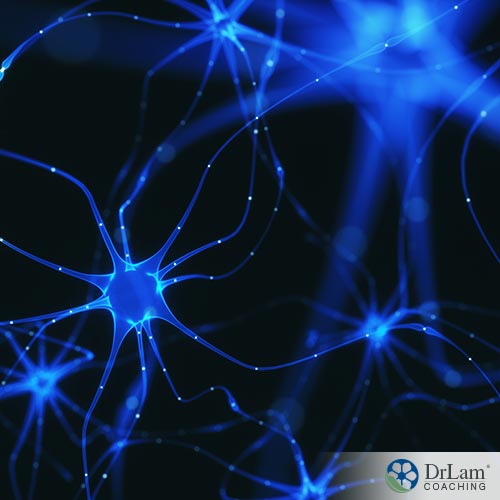 In the field of mental health, as in all fields of health and science, different hypotheses tend to be favored at different times. One hypothesis that gained a lot of interest was the idea that a chemical imbalance in your brain was the cause of depression, anxiety, and other mental health conditions.
In the field of mental health, as in all fields of health and science, different hypotheses tend to be favored at different times. One hypothesis that gained a lot of interest was the idea that a chemical imbalance in your brain was the cause of depression, anxiety, and other mental health conditions.
Essentially, this hypothesis said depression, bipolar disorder, anxiety, and others developed because of either a surplus or deficit of certain neurotransmitters in your brain.
We know these neurotransmitters allow communication to take place between the neurons in your brain. For example, serotonin, dopamine, and norepinephrine are all neurotransmitters.
However, current research has not supported the original idea of chemical imbalance as a cause of mental health conditions. Scientists now consider the concept of a chemical imbalance as more of a figure of speech than a genuine explanation. In other words, scientists now know that mental health conditions result from a multitude of factors.
Certainly, putting aside the idea of a chemical imbalance as the defining factor in developing mental health issues doesn’t do away with the fact that biological factors play a major role in these issues. Current research shows conclusively that several biological components do contribute to depression, bipolar disorder, and anxiety, among other mental health disorders.
No short answer can address this question. Too many factors influence your behavior and mood. However, a chemical imbalance can contribute to the development of mental health disorders.
Some of the other aspects that contribute include:
These factors also interact to influence your risk for mental health issues. For example, trauma or negative psychosocial influences are also likely to co-occur with a family history of mental illness. Thus, it becomes difficult to trace what is the cause and what is the effect.
Several mental health conditions share a link to so-called chemical imbalances as at least a contributing factor in their development.
 Clinical depression affects all aspects of a person’s life from feelings and thoughts to sleep patterns and eating. Some research links depression to a chemical imbalance in the brain. However, this doesn’t explain the condition completely.
Clinical depression affects all aspects of a person’s life from feelings and thoughts to sleep patterns and eating. Some research links depression to a chemical imbalance in the brain. However, this doesn’t explain the condition completely.
If such an imbalance caused clinical depression, then the application of appropriate medications would bring about a cure. But while medications do bring some relief from symptoms, for some people, they do not cure depression, and they do not work for everyone.
Symptoms of depression can vary widely among individuals. For example, one person may experience feelings of guilt and worthlessness, while another may feel apathy, sadness, and hopelessness. Some people sleep too much, while others can’t seem to sleep at all. Some may be hyper-focused, while others experience difficulty concentrating.
In addition, several different types of depression exist. Seasonal affective disorder, major depressive disorder, and postpartum depression, for example. Many women, 10-15%, experience postpartum depression following the birth of a child. As a result of the hormonal changes that take place during pregnancy and after birth, this kind of depression occurs frequently.
A more serious disorder, bipolar disorder typically involves alternating depression and mania. Mania is a condition in which a person experiences greater than normal levels of energy, but cannot focus that energy, often leading to severe lack of sleep and a psychotic episode.
Symptoms vary from person to person. For example, symptoms can include:
In addition, these symptoms can alternate with deep depression. With severe enough symptoms, a person may experience hallucinations and/or delusions.
Although the exact cause of bipolar disorder remains unknown at this time, scientists do know changes in dopamine receptors in the brain take place. Consequently, the levels of dopamine available also change and may contribute to bipolar symptoms.
People often experience anxiety when faced with important decisions or deadlines at work. However, those who suffer from anxiety as a clinical condition can experience anxiety as a constant or nearly constant condition or feel anxiety out of proportion to external circumstances.
Some research indicates GABA neurotransmitters may play a role in the development of this kind of anxiety. This reduces activity in the amygdala, the part of the brain that stores and processes emotional information.
In addition, other neurotransmitters may contribute to anxiety. For example, opioid peptides, oxytocin, serotonin, endocannabinoids, corticotropin-releasing hormone, and neuropeptide Y.
In spite of the popularity of the idea of a chemical imbalance as the primary cause of many mental disorders, it's more likely that what causes these disorders involves multiple factors. The bio-psycho-social model of mental disorders appears to better explain the origins of mental health conditions.
Current research indicates that there are biological changes in major depressive disorders and bipolar disorders that do not include a chemical imbalance.
For example, some recent research shows an association between major depressive disorder and inflammation. In addition, other research indicates the involvement of BDNF (brain-derived neurotrophic factor) may contribute to the development of depression and may affect the action of some antidepressant medications. Likewise, the quick action of ketamine as an antidepressant suggests the involvement of the NMDA receptor as well as the opioid system.
Likewise, a recent hypothesis suggests the involvement of several factors in the development of bipolar disorder. For example, the hypothesis suggests the involvement of a loss of volume in regions of the brain responsible for mood regulation, dysregulation in the interaction of glial cells and neurons, and abnormal hypothalamic-pituitary-adrenal function. All of these are linked with increased inflammation and can contribute significantly to the development and severity of bipolar disorder.
Likewise, sociocultural factors such as early trauma and other significantly stressful life events strongly contribute to the development of severe mood disorders.
 Stress has a significant role in causing the system dysregulations that contribute to mental health disorders. Thus, it is also important to consider how stressors can play a role in activating chemical, hormone, and other imbalances that then lead to other problems.
Stress has a significant role in causing the system dysregulations that contribute to mental health disorders. Thus, it is also important to consider how stressors can play a role in activating chemical, hormone, and other imbalances that then lead to other problems.
When your body comes under stress from any source, the demand for cortisol increases. Cortisol is the hormone used by your body to deal with the effects of stress. With chronic stress, this demand continues for long periods of time. As a result, your adrenal glands become unable to produce and release sufficient amounts of cortisol and become fatigued. This increases inflammation and affects the balance of other hormones and organ systems. The result is a cascade of symptoms increasing in severity over time, known as Adrenal Fatigue Syndrome (AFS).
The body also utilizes the NeuroEndoMetabolic (NEM) Stress Response to spread the task of managing stressors over many body systems. The NEM is a mechanism whereby your body works to maintain homeostasis, and it is a model that describes how these many organs and systems work together. It consists of six circuits, of three organs or systems each, that work in an inter-related fashion to maintain this homeostasis. What affects one circuit will also affect others. These circuits can become dysregulated, resulting in significant symptoms.
If your detoxification circuit becomes dysregulated, you will experience an accumulation of toxins in your body that can lead to mental health problems. The Detoxification circuit of the NEM consists of the liver, interstitium, and immune system, which work in tandem to keep toxins from overwhelming your body.
Under conditions of chronic stress, this circuit can become overloaded. Your liver may not be able to keep up with the demands for detoxification, leading to the interstitium becoming clogged and unable to transport toxins to the liver. This causes an increase in toxins, triggering the immune system to deal with the threats to your body. Immune activity results in increased inflammation. This can lead to increased depression, anxiety, and other mental health disorders.
The backed-up toxins may contain metabolites, the residue from the breakdown of substances ingested. These metabolites may become reactive in nature. An overload of these reactive metabolites can lead to increased inflammation. It may also cause an overactive immune response, increasing inflammation once again.
Antidepressant medications can exacerbate this condition.
Research suggests malfunctions in neurotransmissions may lie at the root of many health disorders. When neurotransmitters do not operate properly the mind and body cannot communicate effectively.
However, it is important to note that it is not only the levels of these transmitters that play a role in problems. Other factors, such as receptor sensitivity, helper cells, detoxification, and inflammation, to name a few, could play as much or a bigger role than the available amount of the neurotransmitters themselves.
For example, dopamine typically acts as a natural reward for pleasurable experiences. But when it reaches too high levels it can lead to anxiety, paranoia, or hyperactivity. If the levels of dopamine get too low, results can lead to depression, compulsive behavior, difficulty concentrating, and addiction.
Chronic stressful conditions in your life can lead to an excess of norepinephrine flooding your body in an effort to deal with this stress. This sympathetic overtone, or excess norepinephrine, can lead to increased inflammation, hyperthyroidism, panic attacks, and high blood pressure.
In order to feel well, you must keep your levels of serotonin within certain limits. If you experience a chronic excess of serotonin, you may encounter:
On the other hand, if you experience a long-term deficiency of serotonin, you may encounter:
There are several reasons people may experience an imbalance of neurotransmitters. For example:
 An inadequate diet can lead to a deficiency in the amino acids that make up the foundation for neurotransmitters. Likewise, these amino acids come from proteins, vitamins, and minerals in your diet. A deficit in any of these nutrients could lead to a deficiency in the level of neurotransmitters in your body.
An inadequate diet can lead to a deficiency in the amino acids that make up the foundation for neurotransmitters. Likewise, these amino acids come from proteins, vitamins, and minerals in your diet. A deficit in any of these nutrients could lead to a deficiency in the level of neurotransmitters in your body.
Alcohol, illegal drugs, nicotine, and some medications can detrimentally affect the function of neurotransmitters. In addition, accumulated toxins in the body, such as from heavy metals in the environment, can also affect neurotransmitters.
Chronic stress leads to increased blood pressure, increased activity of free radicals, and raised insulin levels. As a result, these factors damage the overall production, control, and regulation of neurotransmitters. Under conditions of AFS, excitatory neurotransmitters such as catecholamines typically increase. This comes more frequently as people advance into the moderate to severe categories of AFS. As a result, your body releases more inhibitory neurotransmitters to calm down. Consequently, inhibitory neurotransmitters continue to be released over and over, leading to your body becoming desensitized to them. Production and release then slow down. Therefore, excitatory neurotransmitters become dominant, leading to depression, sleeplessness, and anxiety.
The once-popular idea of a chemical imbalance as the primary cause of mental health disorders has not been supported by research. Rather, the concept of a bio-psycho-social model better explains the origins of these disorders. However, this does not mean that such an imbalance does not play a part. Current research indicates that stress, inflammation, detoxification problems, trauma, genetics, environment, and other factors play a major role in these disorders as well.
This means that, while understanding how your neurotransmitters influence your mental health is important, it is even more important to consider the many other factors in your life that could be contributing to mental health issues. Taking steps like reducing stress, eating a healthy diet, avoiding toxins along with drugs and alcohol, and seeing a therapist or finding a support group can all help you reduce and identify these factors.
If you would like to know more about or need help with, chemical imbalance, the team at Dr. Lam Coaching can help. We offer a free** no-obligation phone consultation at +1 (626) 571-1234 where we will privately discuss your symptoms and various options. You can also send us a question through our Ask The Doctor system by clicking here.
The short answer is no, a chemical imbalance alone does not explain the development of mental health issues. Research shows that the idea of a chemical imbalance as the sole reason for mental health issues is outdated. Current research indicates a bio-psycho-social model to be more accurate and inclusive. This model takes into account the many factors contributing to these problems.
